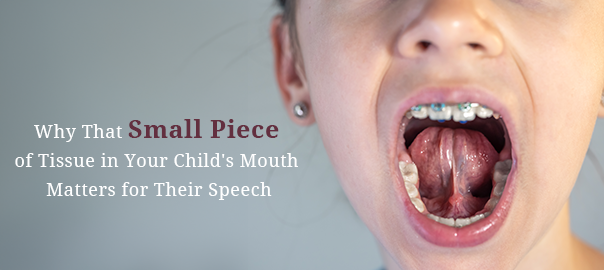
Why That Small Piece of Tissue in Your Child’s Mouth Matters for Their Speech
What is the Frenulum?
The frenulum of the tongue, also called the “lingual frenulum“, is a small fold of tissue located underneath the tongue that connects it to the floor of the mouth, essentially acting as an anchor to help control tongue movement; it’s a thin band of tissue that is visible when you lift your tongue up.
How Frenulum Impacts Speech
Tongue mobility is essential for clear speech production. A restrictive frenulum can significantly affect a child’s ability to create sounds clearly and properly.
Key Speech Challenges
1. Articulation Limitations
- Difficulty pronouncing specific sounds
- Restricted tongue movement
- Challenges with consonants like “s”, “z”, “r”, and “l”
2. Communication Impact
- Potential social interaction difficulties
- Possible academic performance challenges
- Risk of emotional self-esteem issues
Understanding Tongue-Tie (Ankyloglossia)
Clinically also called Ankyloglossia. It is a condition that restricts the tongue’s complete range of movement and is present since birth. A short, tight band of tissue attaches the tongue’s tip to the floor of the mouth. It can affect how a child eats and speaks and can interfere with breastfeeding.
Potential Signs
- Difficulty sticking out the tongue
- Limited tongue movement
- Challenges forming certain speech sounds
- Speech clarity issues
Treatment Options
1. Frenectomy
- Surgical procedure to release the tight frenulum
- Typically quick and minimally invasive
- Can significantly improve tongue mobility
2. Speech Therapy
- Targeted exercises
- Techniques to improve articulation
- Support for language development
Prevention and Support
- Early detection is crucial
- Regular speech and oral assessments
- Consult pediatric professionals if concerns arise
When to Seek Professional Help
Consult a healthcare professional if you notice:
- Persistent speech difficulties
- Limited tongue movement
- Challenges in sound pronunciation
- Social or academic communication issues
Conclusion
Understanding the role of the frenulum in speech development can help parents and caregivers support children’s communication skills effectively. Early intervention and professional guidance can make a significant difference in overcoming tongue-mobility challenges.
Leave a Reply
Leave a Reply
Explore More Similar Posts
Explore More Blogs


Leave a Reply